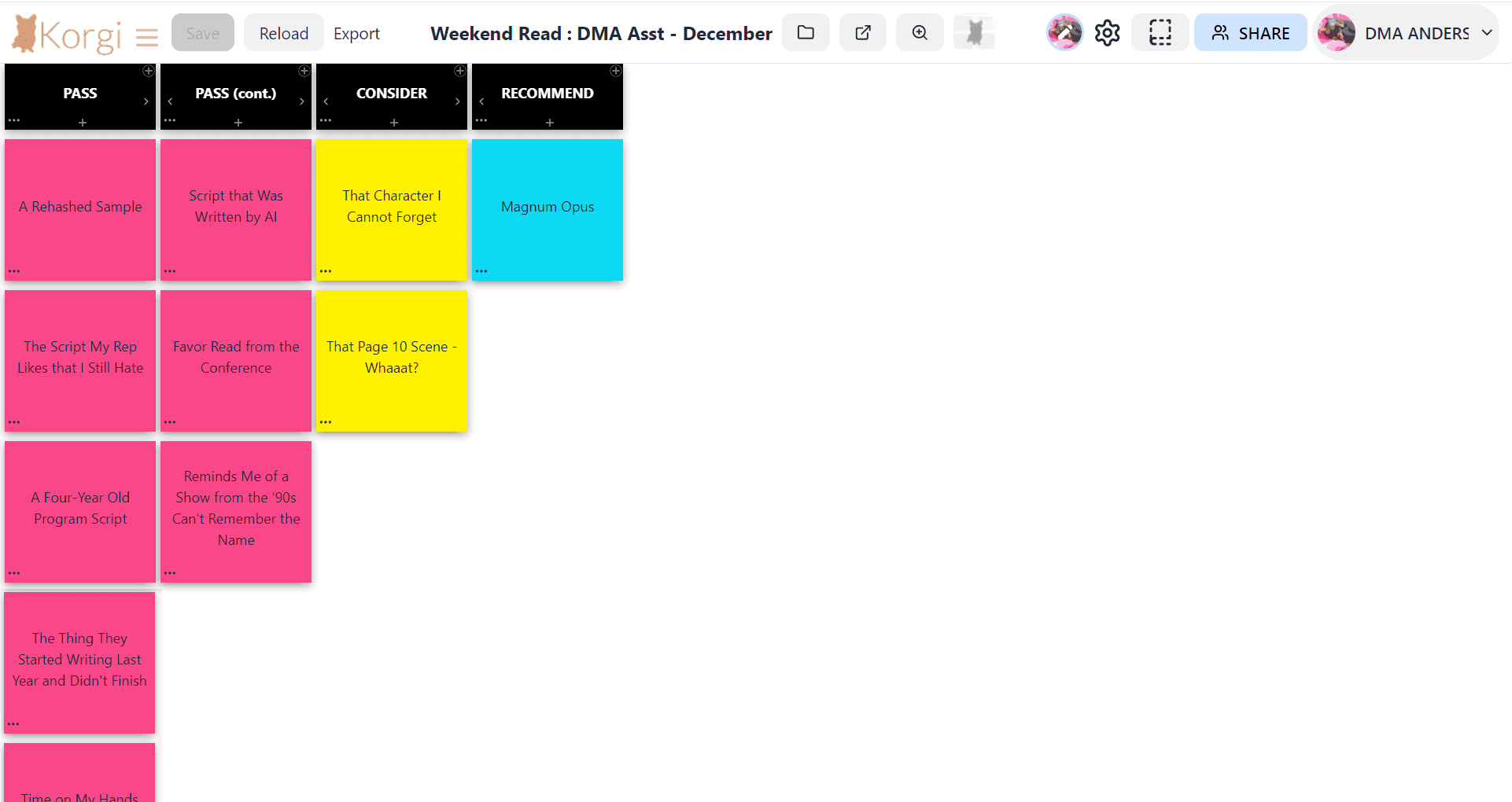You've probably seen this phrase your entire career, no matter how long or short it has been: "No unsolicited submissions." Here are some FAQs to help you decide if and when to press "send" or otherwise share your creative content with other people.
Why your red-hot writing sample isn’t a shoppable pilot (YET)

I'm writing this on a Friday, and like many execs and producers across L.A., I’m facing my weekend read with apprehension. Not because of the height of the stack (typically smaller at this time of year), but because of the temptation of it.
I...LOVE...reading writing samples.
They’re like a literary first date with a writer. And unlike driving behind a stop-and-start delivery truck on a narrow canyon road en route to an L.A. restaurant that inexplicably has no parking lot in a restricted residential parking neighborhood, every writing sample offers the promise of something delicious: an unexplored slice of life, a relationship beat that resonates, a laugh-out-loud scene, the perfect cadence of that one character’s dialogue… That’s the role of the writing sample: to show how well, and how specifically, a writer captures character, voice, choices and moments on the page. The whole idea is to say, “See? Now imagine what I will do on YOUR project!”
To be clear, most samples in a given stack are decidedly NOT great. Maybe 1 in 30 will be. That’s the one that compels you past the first 10 pages all the way to the fade. And the next thing you know, you’re calling the rep (or following up on your waiver) to say, “Let’s meet.”
To be clear, most samples in a given stack are decidedly NOT great. Maybe 1 in 30 will be.
Why do I call? I’m always wildly curious about what motivated a writer to create a great writing sample. I want to ask tons of questions, see what else is underneath a character, a world, a moment, a sentiment I caught a glimmer of. And when those calls go well, and how I love when they do, sometimes I take an unexpected next step in the relationship and say: “I’d like to develop this.”
And this moment, like those dimly lit, parking-ticketed dinners, is where Producers are from Mars and Writers are from Venus. Because we often aren’t yet having the same conversation. The writer, and sometimes their rep, thinks I “really” mean: I want to take this script, as it is written, and start shopping it to my Rolodex (Gen X)/Contacts (Gen Y)/Out-of-Life-Balance, Aging Co-Conspirators (Gen Z. They’re not wrong). Or that I'll give them notes on a couple of passes and then take their script, again, pretty much as written, out to market. And no matter how clearly and repeatedly I explain my true intentions for their project, which I sincerely have feelings for, I very rarely succeed in explaining that we often will have to do a page 11-rewrite to transform said writing sample into a sellable pilot.
That’s because a writing sample delivers a one-episode character. Your great writing sample protagonist has a clear voice and memorable dialogue, moves with granular and escalating choices through a defined mini-mission, and/or showcases secondary characters vividly on the page. A sample’s goal is to demonstrate your skill as a writer, to close or wholly eliminate any gap between what I need done on my show and what you will be able to do on Day One of your hire. To shift you from “drive on” to “parking space,” from lunch at home to team lunch order…after team lunch order…to bringing your own lunch from home to the room.
A writing sample delivers a one-episode character.
Your great writing sample doesn’t have to worry about setting up the core trait of a protagonist that drives their every self-limiting choice…deftly building the authentic new world you’re going to drop them into so it constantly and increasingly conflicts with that trait…finely crafting distinct secondary characters and placing them in organic roles in that world to fully dimensionalize that protagonist…establishing the stakes, jeopardy and glue that will challenge your lead on their new mission…or weaving in a clear, relatable, resonant theme that guides them like a reluctant, recalcitrant, resistant little North Star on their way.
That’s because when you’re staffed on a project, the show’s creator(s), producers and executives already have done that work. They just need you to flow with the characters and world they’ve already fought the beautiful battles for.
They already wrote, shopped and sold…a PILOT.
A pilot absolutely has to unveil a 100-episode character. Not something entertaining in a single read; something absolutely undeniable in the vision it unfolds for a character season after season. (Okay, yes, our industry has changed, so your pilot may only make it to eight episodes before social media begins decrying its untimely demise, but it still needs 100-episode-level vision.) (Okay, okay, I also know you’re not going to make old-fashioned 100-episode residuals if it isn’t a broadcast show, but the creative rules of our “show” have not changed as much as the financial rules of our “business.”)
A pilot absolutely has to unveil a 100-episode character. Not something entertaining in a single read; something absolutely undeniable in the vision it unfolds for a character season after season.
A 100-episode character has to be clearly set up, on page one, with a singular and memorable, core trait-revealing moment. Then within the next few pages, that new world has to arrive. And the reluctant mission must begin. Meanwhile, each character must arrive organically, with their own mini-mission and traits and relationship dynamic, applying their specific pressure to the protagonist, starting their own dovetailing stories. The protagonist must fully arc in the episode, yet somehow only move a grain of sugar (or salt) towards evolution, so we have somewhere to take them...for 99 more episodes. And the single, solitary, crystal clear theme has to be established and sewn into the fabric of every scene and into the choices, wins, losses, escalations and retreats of our characters.
A great pilot is so well-executed that through its synopsis alone, a roomful of writers can instantly start pitching possible episodes and generate laughter, familiarity, tension and even tears because they all immediately know what these characters would do. Not what they did that one time, in your great writing sample, but what they will do 100 times, in an ever-evolving fashion, towards becoming better people and making the world a better place. (And before you say it, yes, even if it’s Walter White. Watch that series finale again.)
Of course, not every writing sample could be a great pilot, and not many great pilots start from writing samples. But in the event yours IS that great sample, and you’re ready for it to become a great pilot, the first step is to reframe. It’s not your premise, or the plot, or that one joke, or that moment everyone mentions, or the characters themselves that make a sample pilot-worthy. It’s the promise of one or a few of those things. And like all relationships, building out that promise and making it great will take dedicated work.
Or, you can shop and sell your sample as-is without doing all that work. It happens! But should you find yourself in development hell as a result, here’s a weekend read especially for you.
